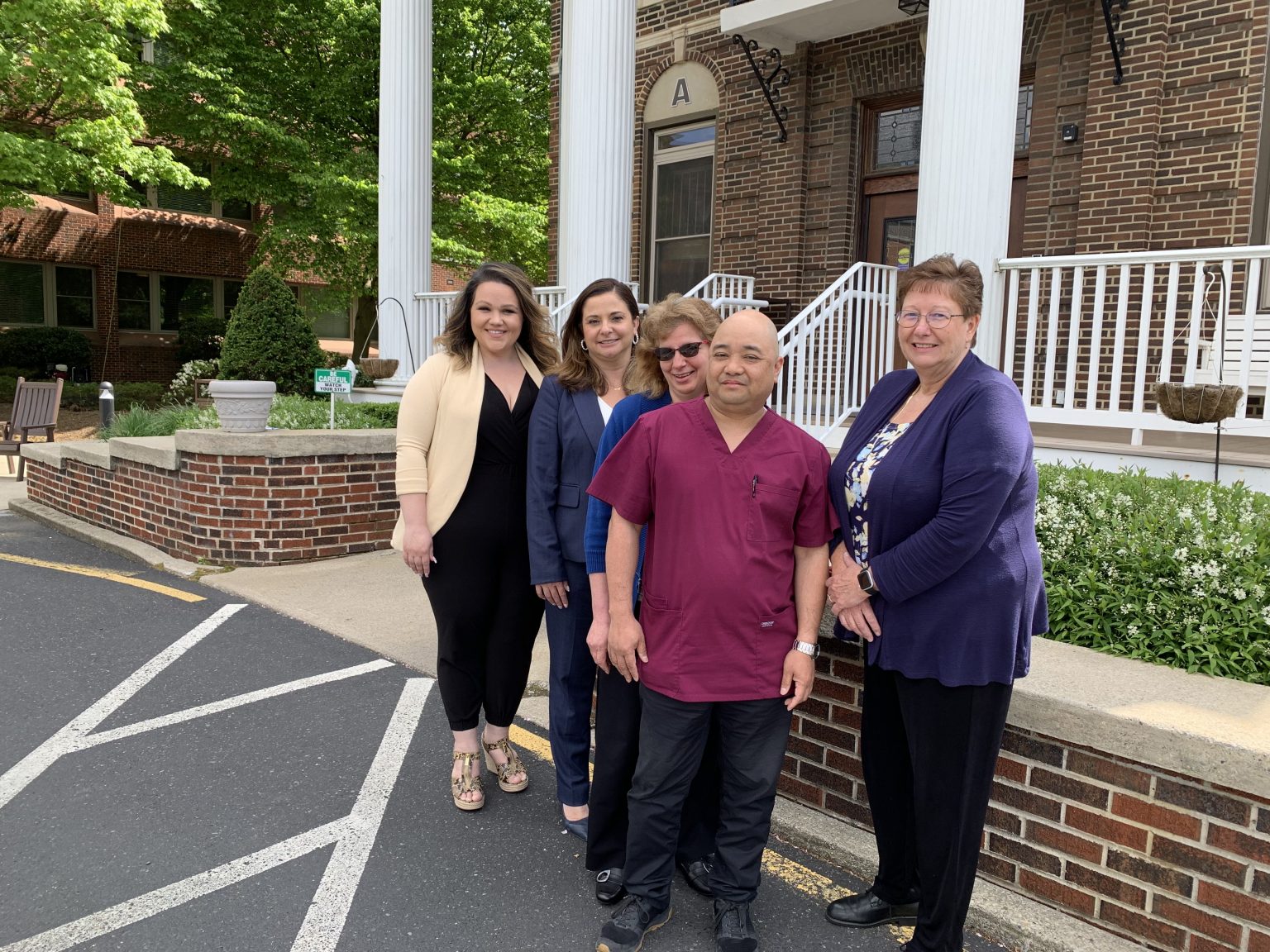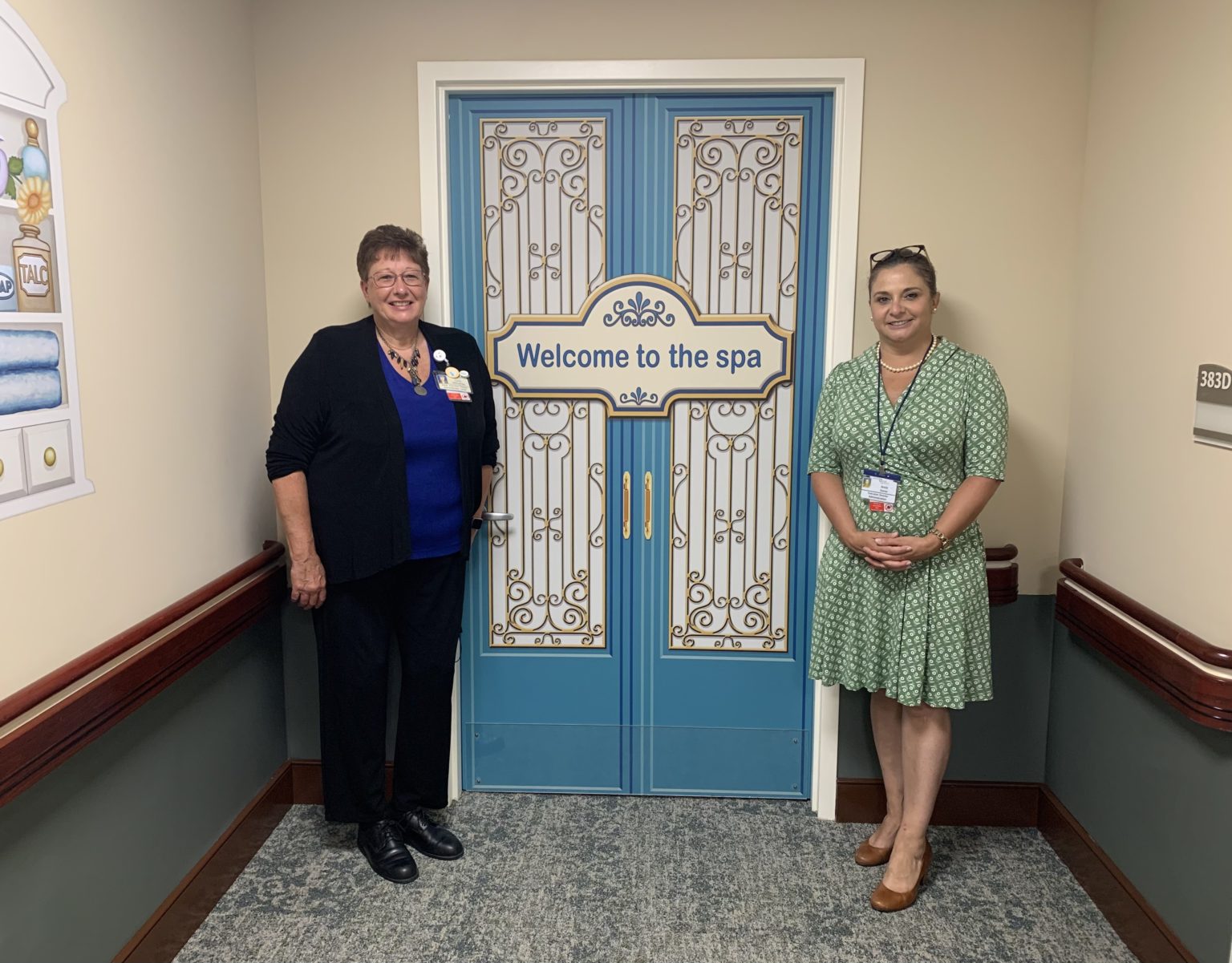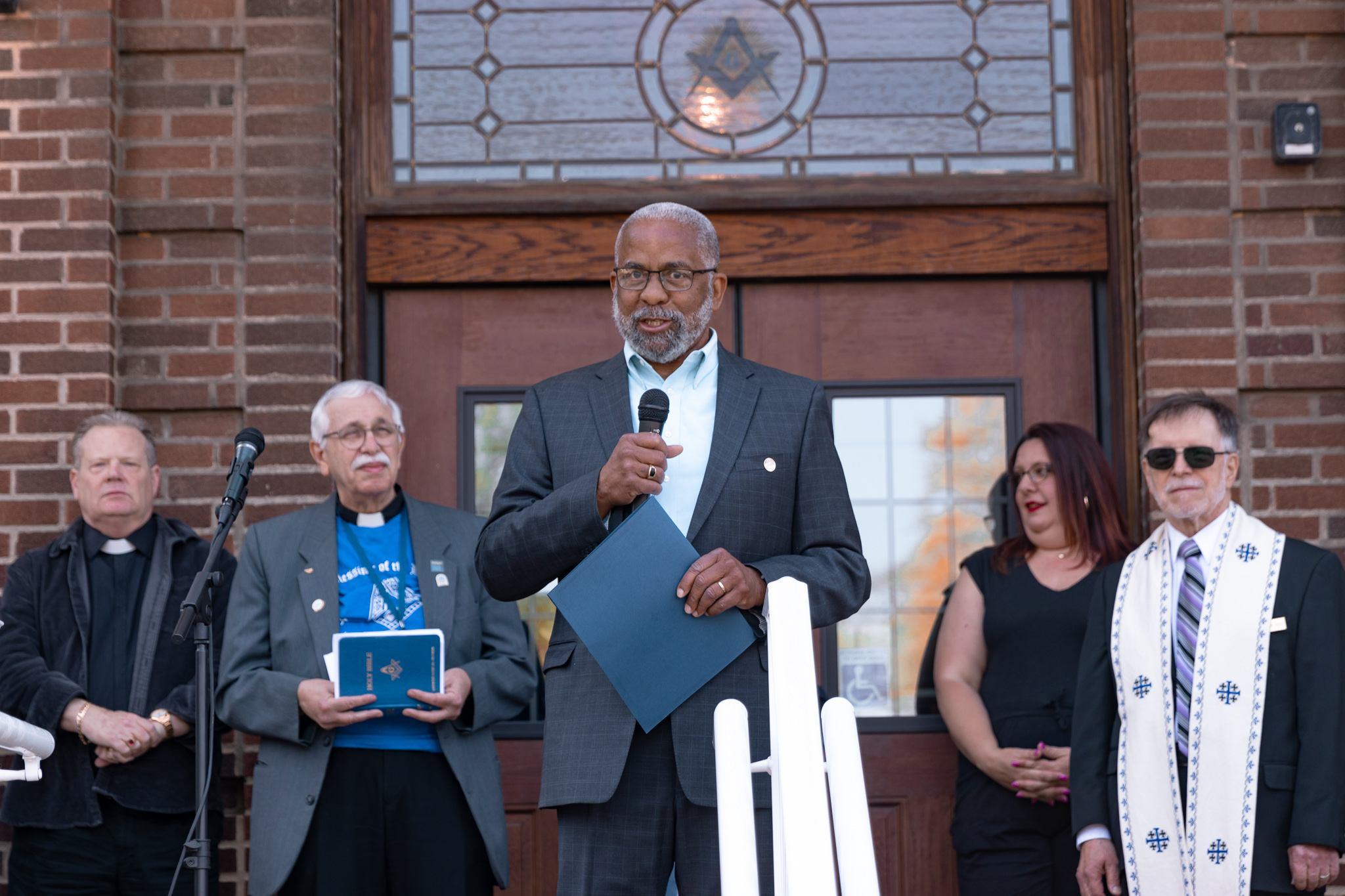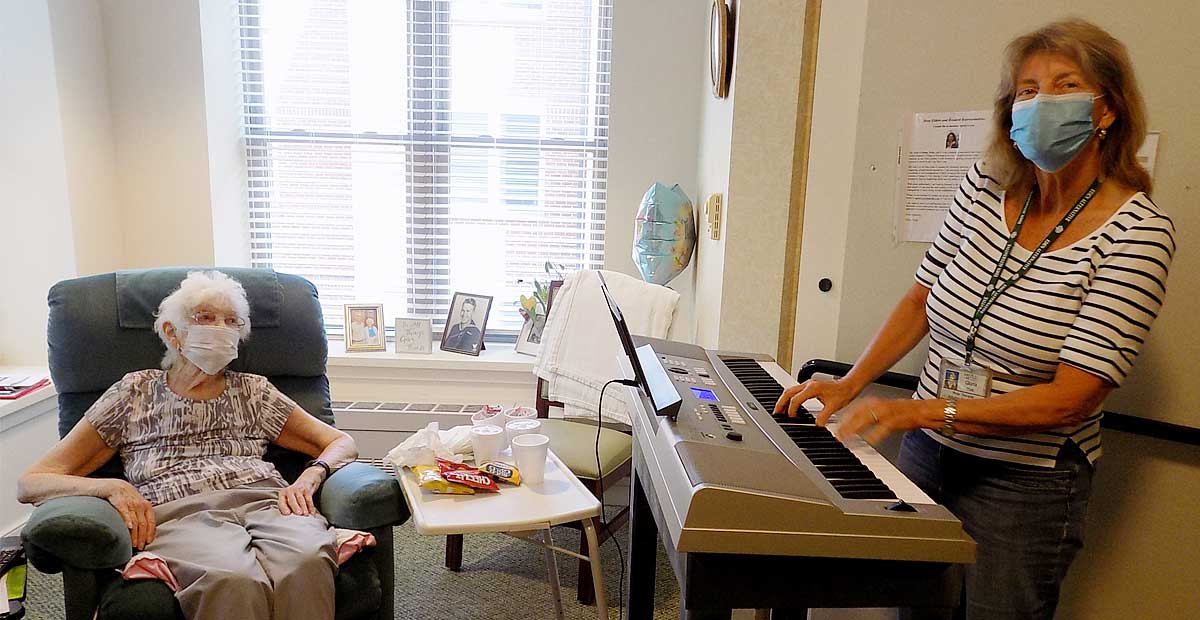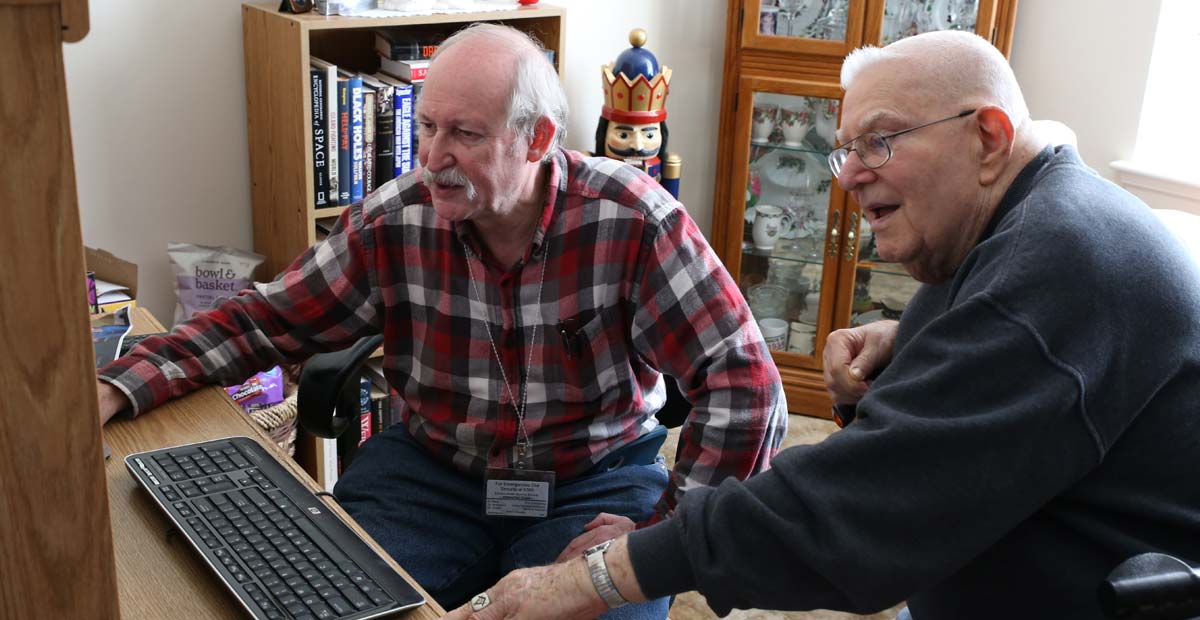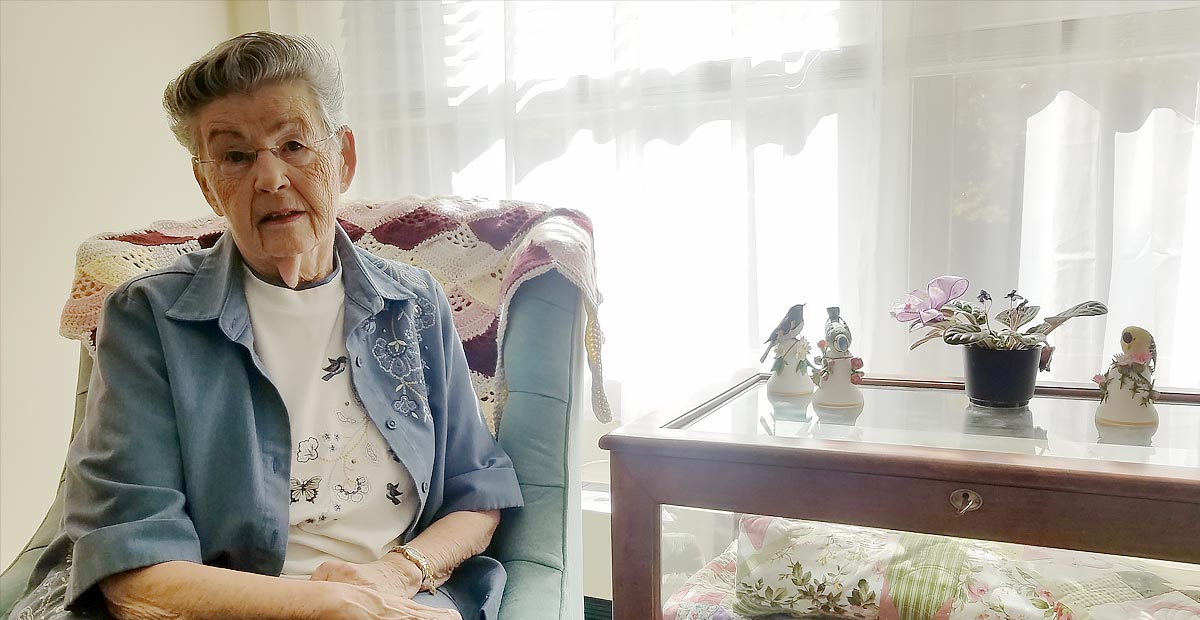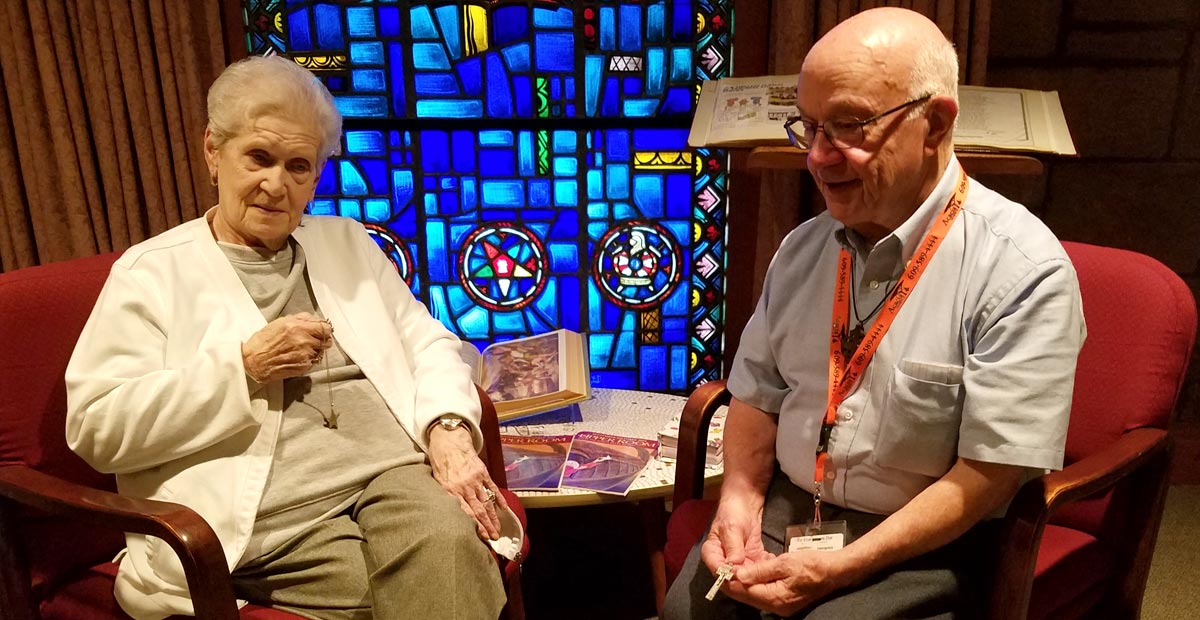Masonic Village at Burlington’s Management Company Ranked #1 in J.D. Power 2022 U.S. Senior Living Satisfaction Study
Masonic Village enhances memory-care facility
Burlington Township mayor and local dignitaries Kick off “Blessing of the Bikes”
How Masonic Village at Burlington is Helping Residents Combat Loneliness During COVID-19
During this time of social distancing with COVID-19, Masonic Village at Burlington residents in nursing care and assisted living areas may feel lonely or isolated from largely staying in their rooms and not being able to visit with their loved ones.
Recreation therapists, social workers and other staff across the village are working hard to keep residents occupied, whether it’s by connecting them to family members via video chat, reading their mail to them or just stopping by to see how they’re doing. Staff help to facilitate video chats with residents and their families to help decrease their feelings of loneliness.
“We have several residents who own electronic devices through which their family can call them,” said Tammy George, director of activities.
“We are able to broadcast to our residents in their rooms from our chapel, so since quarantine began, we’ve been providing different activities that are being shown through their televisions each day,” Tammy said. These activities include morning exercises, music therapy, trivia, virtual bingo, sing-a-longs and more. On “Fun Friday,” team members hold lip sync contests (residents vote on the winners), perform skits and play Family Feud.
“Residents really enjoy the Friday activities,” Tammy said. “We’re kind of silly, which is okay. It is fun for the residents to see people they know performing. As we start to reopen, we’ll continue to add to our regular programming.”
Staff also provide one-on-one attention to residents. On Tuesdays, Gloria Turk, music therapist, strolls from room to room with her electric piano. On Thursdays, staff distribute alcoholic beverages and snacks during “Happy Hour.” They also provide an ice cream cart for residents twice a month.
Families of residents have dropped off care packages, restaurant food, mail and cards, which team members help open and read to the residents.
“Some residents get daily newspaper subscriptions,” Tammy said. “We have a lot of supplies we give them to do in their rooms, like jigsaw puzzles. We also have DVD players and a DVD library.”
The team works together to sit down and chat with residents who may be lonely, are having a bad day or just need someone to talk to. “It’s key to have consistency with the same caregivers,” she said. “We’ve become their family.”
Providing the Best and Safest Care
Masonic Village at Burlington is proud to be a restraint and alarm-free community, as part of our mission to provide personalized, compassionate care and to promote the highest quality of life for our residents.
We do not utilize bed or chair alarms, or restraints such as vests, lap trays or bed side rails for residents at risk of falling, as they can actually be detrimental to our residents’ quality of life.
About 1,800 older adults living in long-term care facilities die each year from fall-related injuries, according to the Centers for Disease Control and Prevention (CDC). Years ago, there was a common misconception that restraints improved the safety of frail older adults. However, research shows restraints can be dangerous and often entail more risks than benefits.
Limiting a patient’s freedom to move around leads to muscle weakness and reduces physical function, thereby increasing the risk of falls. Many studies document the dangers of restraints and recommend more dignified methods to improve residents’ safety.
“We have two small enabler rails on the beds that people can use to grasp ahold of to pull themselves up or turn over, but we do not use full side rails or four-quarter side rails,” said Cindy Shemansky, assistant executive director/administrator at Masonic Village at Burlington. “People can seriously injure themselves when trying to get up through or around a side rail.”
The use of bed and chair alarms proliferated in the 1990s, when physical restraints were banned at nursing facilities nationwide. The alarms were intended to go off when a resident’s weight shifted, indicating they might be at risk for falling. But research shows alarms have a negative effect on the resident’s quality of life. They interrupt sleep and can cause agitation and restlessness.
“When we were using alarms, any tiny movement a person made, the alarm would go off,” Cindy said. “You have all this noise. It was annoying to the resident as the alarm would stay on until a team member responded. It also immobilized residents because they were afraid of moving as it would set off their alarm.”
Both alarms and restraints were phased out in 2016 as part of a nationwide movement in favor of more proactive, attentive care. Research today shows a reduction in falls at multiple long-term care communities that discontinued the use of the alarms. Instead, they tailored fall prevention for individuals by, for example, altering bathroom schedules, room re-arrangements and other measures, according to the CDC.
If your loved one is assessed to be at risk for falls, Masonic Village at Burlington will create an individualized plan of care with interventions aimed at helping reduce falls and injuries and provide peace of mind to residents and their families.
Volunteer Helps Residents Ease Into Technology
Steve Preissman is a jack of all trades when it comes to technology.
On any given day, you will see him at Masonic Village at Burlington, helping one resident transfer photos from their phone to their laptop and another resident establish a clearer picture on his television.
“I enjoy helping people, and I’ve always had an aptitude for technology,” Steve said. “I’m a retired software engineer by trade, and I’ve stayed (working) with computers.”
Steve has volunteered at Masonic Village since 2017. He recently hosted a “Tech Talk” about how to use your cell phone to take photos and videos. Prior to that, he ran an “Introduction to Smartphones class.”
Steve lives about 15 minutes away and typically visits three days a week for a few hours, depending on the residents’ technological needs. His only fee is a smile. “You have to have a smile or it’s not worth it [me helping],” he said.
Steve said he never gets frustrated with someone’s lack of aptitude for technology. “It’s amazing how well some of them learn,” he said, after the most recent Tech Talk, attended by more than 11 people. “One lady I’ve been working with for a couple years has gotten so much better with her phone. It feels good to see the improvement. Some people take longer than others. You just have to be patient. I plan to continue doing this for a long time to come.”
A Mason himself, Steve has been a member of Rising Sun Lodge No. 15 in Haddonfield, NJ, for more than 40 years and is a past District Deputy Grand Master.
“I love the ritual and the people,” he said. “There are so many good men in the organization and good fellowships. It’s amazing the people you meet and the help you can get and give. It’s a great fraternity.”
Tips for Downsizing
Older adults often feel overwhelmed by the downsizing process. Sometimes they are downsizing after an acute illness or injury or that of their partner. Sometimes a family member is strongly encouraging them to make the transition. Sometimes they decide the space they are in no longer suits their needs.
No matter the reason, they are making the decision to move and likely feeling a sense of loss and a lack of control, said Bari Wachs, owner of Caring Transitions of South Jersey, a company that offers relocation services such as downsizing, decluttering and estate sales, and works with facilities including the Masonic Village at Burlington.
Preparing for a new “rightsized” space – whether it’s to an independent or assisted living facility – can be an overwhelming prospect but planning for your move in advance can help lessen some of the anxiety associated with the process.”
“This can be a very stressful time,” she said. “Many are making a transition and asking other for assistance having been fiercely independent most of their lives. Often, they are focusing on the past, rather than the future. We help them focus on all of the benefits associate with the new community and how exciting this new beginning is for them.”
Mae Tilghman, a Masonic Village at Burlington resident, recently moved from her home of 60 years into a smaller space. It was difficult for her to decide what to keep and what to let go of in the moving process. But after she was all moved in, she was happy she made the decision to downsize.
“I was relieved that I no longer had to worry about leaks, replacing appliances, maintaining a lawn or any kind of maintenance on my house,” she said.
Below are some tips to make downsizing easier:
- Declutter – Make decisions to keep, toss or store things together. “In the sorting process, I talk with clients about what they need, what they love/want and what they can live without,” Bari said. “I always try to encourage taking items like tall bookshelves, because these provide vertical space to include more of the personal items that make a smaller space feel more like ’home.’”
- Donate – Share unused items with a consignment/thrift store, family or friends.
- Document – Take photos with you to recreate familiar spaces in the new home.
- Self-storage – The best route if size is an issue or security is a concern.
- Moving – Consider hiring professionals to ensure a faster and less stressful move.
Reasons Seniors Should Volunteer Their Time
Volunteering makes you feel good. It’s also good for your health and well-being.
This is especially true if you’re age 55 and older, according to a recent report by the Corporation for National and Community Service (CNCS), the federal agency responsible for the nation’s volunteer and service efforts.
Volunteering keeps the brain active, which contributes to a person’s cognitive health and may lower the risk of dementia and other health problems in older adults. It prevents isolation and depression by engaging in enriching activities with other people outside of the home and building connections. Volunteering also promotes physical activity and fitness, which helps fend off diseases as you age, reduces stress and may even help you live longer.
Bob Bursley, a Masonic Village at Burlington resident, volunteers at the village and with Acacia Hospice. He gives communion to residents four times a month, and on certain Fridays, he prays the rosary with residents. With hospice, he visits and spends time with patients.
“One of my primary goals is to be present and to share the Psalms from the Bible with these people as they come to the end of their lives,” Bob said. “It’s a wonderful opportunity to grow in compassion for our brothers and sisters.”
Through his volunteer experiences, Bob said he has formed a deeper understanding of the beauty and fragility of life.
“I’ve become very conscious of how blessed I have been in my life and how my relocation to Masonic Village established a base for me to express my gratitude through service to others,” he said. “It deepens my faith.”
Like Bob, older adults are encouraged to find an activity they are passionate about. Volunteering is best for all parties involved when you’re doing something you enjoy. It’s never too late to start. Whether you’ve just retired or are in your later years, there is an opportunity out there for you. Seize it!
For more information on the Masonic Village Volunteer Program contact Tonya Costley-Stilts, Director of Resident Services, at 609-239-3866. For more information on Acacia Hospice Volunteers contact Danielle Verguldi at 609-589-4072.

